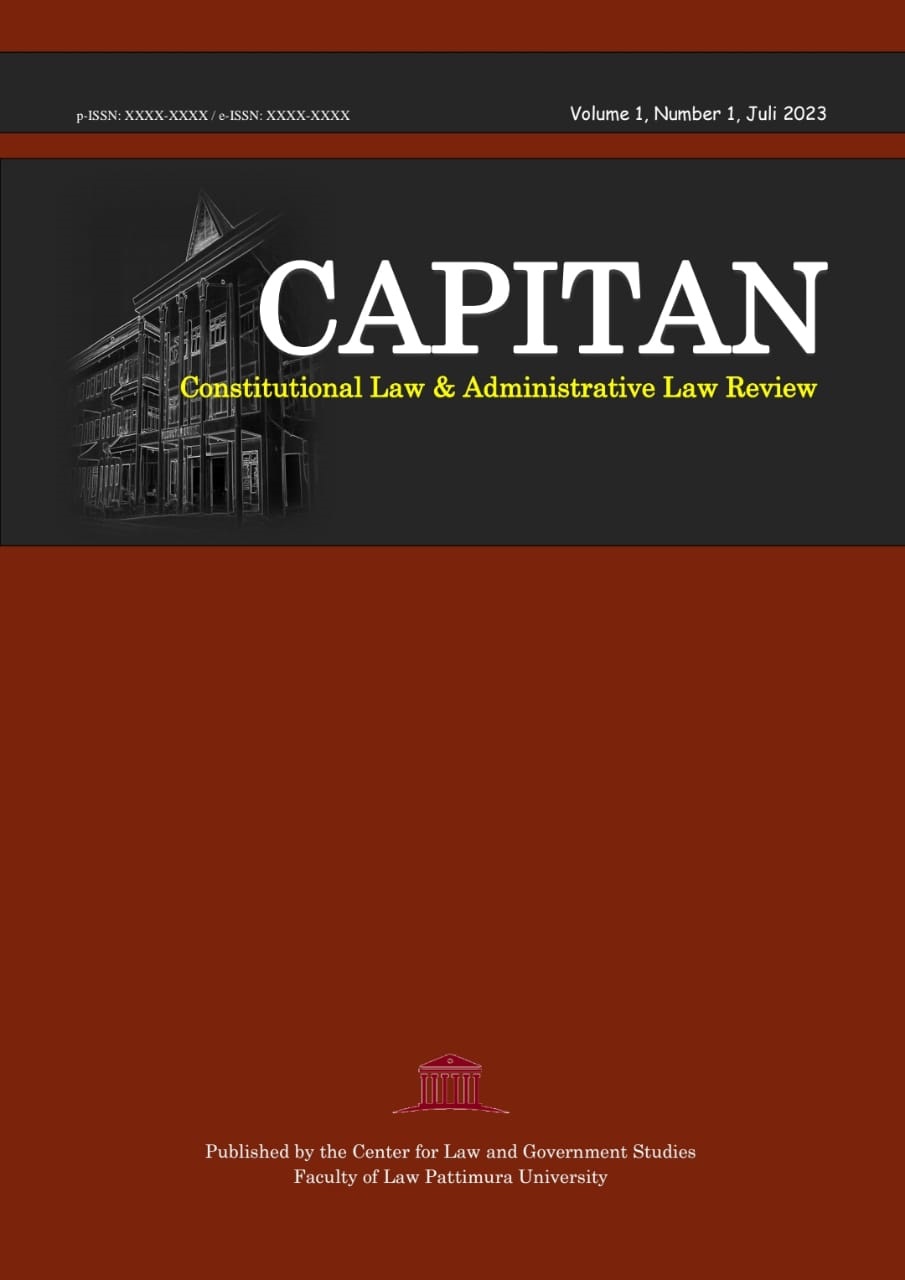Tanggung Jawab Pemerintah Terhadap Keamanan Data Diri Warga Negara Indonesia
Abstract
Personal data is a human right protected by the constitution. Protection of personal data of Indonesian citizens is still weak, causing an increase in many cases of data leaks that are exploited by irresponsible parties. Protection of personal data in Indonesia is still sectoral, based on the authority granted by regulations governing personal data. The absence of specific regulations governing the protection of personal data causes frequent data leaks. The Ministry of Communication and Information has the authority to maintain personal security in Government Regulation Number 71 of 2019 concerning the Implementation of Electronic Systems and Transactions, which gives the Ministry of Communication and Information the authority to supervise the implementation of electronic systems and transactions. The government's responsibility has been regulated in Article 58 paragraph 1 of Law Number 27 of 2022 concerning Protection of Personal Data, which states that "The government plays a role in realizing the implementation of personal data protection in accordance with the provisions of the law." The forms of efforts made by the government regarding the protection of its citizens' personal data are in the form of increasing system security, conducting security supervision, providing security certification, security auditors, cooperation with the security industry and the government has the authority to require violators to inform the public or related parties of the violation. Additional types of administrative sanctions may include written warnings, temporary suspension of personal data processing activities, deletion or destruction of personal data, and/or financial fines.
Downloads
References
A. A. Zaman, J. Anwar, and A. Fadlian, “Pertanggungjawaban Pidana Kebocoran Data BPJS Dalam Perspektif UU ITE,” Juncto Delictio, Vol. 1, No. 2, February, (2024).
Anantia Ayu D., dkk, Perlindungan Hak Privasi atas Data Diri di Era Ekonomi Digital, Jakarta: Pusat Penelitian dan Pengkajian Perkara dan Pengelolaan Perpustakaan Kepaniteraan dan Sekretariat Jenderal Mahkamah Konstitusi, 2019.
Annur, C. M., BSI, Bank Syariah yang Paling Banyak Digunakan Masyarakat Indonesia, https://databoks.katadata.co.id/datapublish/2023/05/03/bsi-bank-syariahyang-paling-banyak-digunakan-masyarakat-indonesia.
Cholid Nabuko dan Abu Achmadi, Metodologi Peneitian, Jakarta: Cet.VI, PT. Bumi Aksara, 2005.
Erlyns Yolanda dan Ragun Romaida Hutabarat, “Urgensi Lembaga Pelindungan Data Pribadi Di Indonesia Berdasarkan Asas Hukum Responsif”, Syntax Literate: Jurnal Ilmiah Indonesia, Vol. 8, No. 6, Juni (2025).
European Union Agency for Fundamental Rights and Council of Europe, Handbook on European Data Protection Law, Belgium: 2019.
J Lee Riccardi, “The German Federal Data Protection Act of 1977: Protecting the Right to Privacy”, Boston College International and Comparative Law Review, Volume 6, Issue 1, (1983).
M Iqsan Sirie, From Act To Action: Strategi Implementasi UU Perlindungan Data Pribadi, https://appdiorid-fromactto-action strategi implementasi-uu-perlindungan-data-pribadi.
Makarim, E., Kompilasi hukum telematika, Jakarta: RajaGrafindo Persada, 2003.
Nuruddin, M. I., dan Iqbal, M. R., Dinamika Sistem Hukum Tata Negara dalam Konteks Perubahan Konstitusi di Era Digital, (2024).
Ramli & M. Ahmad, Cyber Law Dan HAKI Dalam Sistem Hukum Indonesia. Bandung; Refika Aditama, 2004.
Romanosky, Sasha, and Alessandro Acquisti, “Privacy Costs and Personal Data Protection: Economic and Legal Perspectives”, Berkeley Technology Law Journal, Volume 24, Nomor 3 (2009): 1061–1101. http://www.jstor.org/stable/24118273.
www.kominfo.go.id.
Siti Yuniarti, perlindungan data pribadi di Indonesia.
Titik Triwulan dan Shinta, Perlindungan Hukum Pasien, Jakarta: Prestasi Pustaka, 2010.
Copyright (c) 2025 Riska Putri Yesika Nainggolan, Jantje Tjiptabudy, Merlien Irene Matitaputty (Author)

This work is licensed under a Creative Commons Attribution-NonCommercial 4.0 International License.
Authors who publish their manuscripts in this Journal agree to the following conditions:
- The copyright in each article belongs to the author, as well as the right to patent.
- Authors are able to enter into separate, additional contractual arrangements for the non-exclusive distribution of the journal's published version of the work (e.g., post it to an institutional repository or publish it in a book), with an acknowledgment of its initial publication in this journal.
- Authors are permitted and encouraged to post their work online (e.g., in institutional repositories or on their website) prior to and during the submission process, as it can lead to productive exchanges, as well as earlier and greater citation of published work.
- Authors have the right to self-archiving of the article (Author Self-Archiving Policy)













